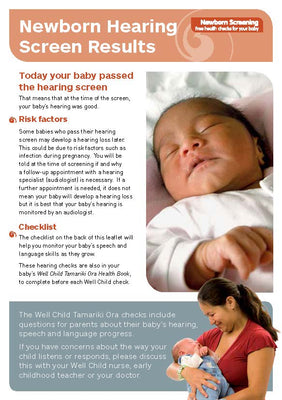Newborn Hearing Screen Results - English version - HE1922

Explaining that a baby has passed its newborn hearing screening, including a checklist for parents to keep monitoring their baby's hearing.
The full resource:
Newborn Hearing Screen Results
Newborn Screening
Free health checks for your baby
Today your baby passed the hearing screen
That means that at the time of the screen, your baby’s hearing was good.
Risk factors
Some babies who pass their hearing screen may develop a hearing loss later. This could be due to risk factors such as infection during pregnancy. You will be told at the time of screening if and why a follow-up appointment with a hearing specialist (audiologist) is necessary. If a further appointment is needed, it does not mean your baby will develop a hearing loss but it is best that your baby’s hearing is monitored by an audiologist.
Checklist
The checklist on the back of this leaflet will help you monitor your baby’s speech and language skills as they grow.
These hearing checks are also in your baby’s Well Child Tamariki Ora Health Book, to complete before each Well Child check.
The Well Child Tamariki Ora checks include questions for parents about their baby’s hearing, speech and language progress.
If you have concerns about the way your child listens or responds, please discuss this with your Well Child nurse, early childhood teacher or your doctor.
Hearing Checklist
Can your baby hear?
At 4–10 weeks, when there is a sudden loud noise, do they:
- jump or blink?
- stir in their sleep?
- stop sucking for a moment?
- look up from sucking?
- cry?
At 3–4 months, do they:
- blink or cry when there is a sudden noise?
- stop crying or sucking when you talk?
- wake or stir to loud sounds?
- coo or smile when you talk?
- turn their eyes toward voices?
- seem to like a musical toy?
- stop moving when there is a new sound?
- seem to know your voice?
At 5–7 months, do they:
- turn towards a sound or someone speaking?
- cry when there is a sudden noise?
- like music?
- make lots of different babbling sounds?
- sometimes copy sounds you make?
At 9–12 months, do they:
- respond to their own name?
- look around to find new sounds – even quiet ones?
- understand ‘no’ and ‘bye-bye’?
- listen when people talk?
- like copying sounds?
- use babbling that sounds like real speech?
- try to talk back when you talk?
These hearing checklists, and checklists for children over 12 months, are in your baby’s Well Child Tamariki Ora Health Book.
For further information about newborn hearing screening, visit Universal hearing screening for newborns